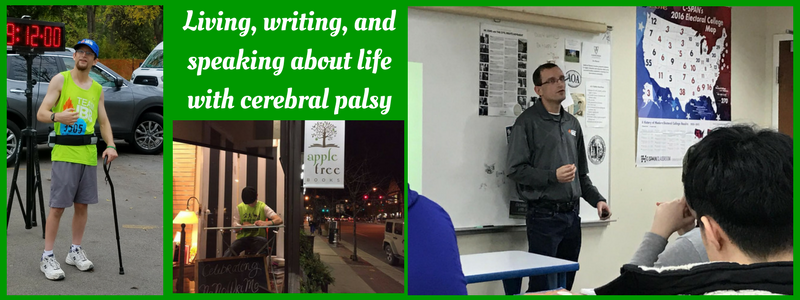Living with cerebral palsy (CP) remains an emotional journey. Awkwardness can loom over interactions. Anxiousness may rumble about as you explore new environments, trying to identify tripping hazards. Frustration brews when your own two feet become the cause for your stumble or fall. Considering these emotions, loving your cerebral palsy may seem like an odd concept. Thus, the reason for today’s post. To provide some guidance so you can learn to love your CP.
To learn to love your CP first requires better understanding love. Ironically, love often gets romanticized. Someone says love and you and I conjure up blissful imagery. Young love symbolized by a heart carved in a tree with two names inside. An old couple, personifying a time-tested love, holding hands walking through the mall.
However, going from one to the other takes work. An open mind to learn and grow. A willingness to compromise. The maturity to admit, “I was wrong.” Through this growth and compromise you mature into a better person. That constitutes love. Or, at least in my opinion. By continuing to read, you accept this interpretation as the foundation for learning to love your CP.
Another Meaning for CP
Getting to the point where you can learn to love your cerebral palsy and evolve into a better person involves adopting a new meaning for CP. Rather than cerebral palsy, let CP mean “challenging perspectives.” A key question to ask yourself when challenging your perspective remains, “How could I make this a positive for me?”
Allow me to provide an example or two. Living with cerebral palsy requires consistent physical care. I need to exercise, stretch, and get a full eight hours of sleep a night to function at my best. I could view such needs as a time suck. Taking time away from other, more leisurely activities.
Instead, I found a way to make the situation into a positive. Learning to view the need for consistent physical care as a guiding light. Illuminating what I should make a priority in my day. Setting priorities proves key towards setting your personal foundation and living your best life.
Not Always Instant
Honestly, sometimes finding the positive in a situation stands difficult. Enter the need for patience. Thanks to my cerebral palsy, I made the choice not to drive. A decision which could easily weigh me down with negativity. For instance, I remember when I first completed training at work to substitute as a branch services clerk. Due to my transportation situation, I could basically sub at three branches. Limiting potential opportunity and experience. Frustrating!
Admittedly, asking myself, “How could I make this a positive for me?” did not help. At least initially. In time though, the positive emerged. Since I only substituted at three branches, those libraries had the chance to get to know me and my work ethic. I feel that assisted me in getting the position I currently hold in my library’s system.
Entering the job interview, I remained a known commodity to the branch manager and department supervisor. A familiarity which gave me an advantage over external candidates. Said advantage gets diluted had I substituted at more branches since that would mean I would substitute less frequently at the branch I applied to work at. Essentially, long-term, my transportation limits turned into a benefit. I just needed to demonstrate patience while the positive developed.
I Know! I Hear You
Waiting for the positive to develop might leave you groaning that old cliché, “Easier said than done.” Patience alone does prove trying. Partner patience with another characteristic though, and you will empower yourself. That mystery characteristic? Belief!
Believe everything will work out. Perhaps not today or tomorrow, next week, or even next month, but eventually. The best example I could give goes back to my teenage years. I had back surgery at 14 years old. Waking up from the surgery, doctors commanded me to move my right leg. I tried, but to no avail. My leg had become paralyzed. A true worst situation.
Perhaps more concerning, doctors remained unsure what happened. A worrisome and potential defeating moment. Yet I never thought “What if I don’t walk again?” Rather I knew, I believed, I would get back on my own two feet. In fact, I dare say my cerebral palsy prepared me to go through the intense and vigorous rehabilitation process. Literally undergoing physical therapy since I could walk, I knew the importance behind working hard in therapy. Enabling me to not only get back on my own two feet, but to grow stronger. Even to the point where in my adult life I accomplished what I once deemed “unreasonable.” Completing a marathon. That path to achievement I detail in my memoir Slow and Cerebral.
Begin to Learn to Love Your Cerebral Palsy
Through belief, patience, and challenging perspectives you can learn to love your cerebral palsy. Not the romanticized love you and I tend to conjure up, but rather our agreed definition. Love that takes work leading you to grow and compromise until you mature into a better person. So, let me get you started on this love journey by asking how will you challenge your perspectives? Tell me in the comments!
Until next time, remember. Don’t blend in. Blend out!
-Zachary



Thank you for the information. It is very interesting.
Thanks for the post, Zach. I agree with your definition of love and admire your honesty when you shared that asking yourself, “How can I look at this positively did not work at first,” after the decision not to drive decreased your opportunities to work at other branches. By making that statement of honesty, you let all of us, your readers, understand that asking this question isn’t a catch ll and guarantee for improving situations but a daily question you have to ask repeatedly out of love for your CP.
Thank you David for reading and for your comment. I believe honesty is essential because honesty helps to establish proper expectations.